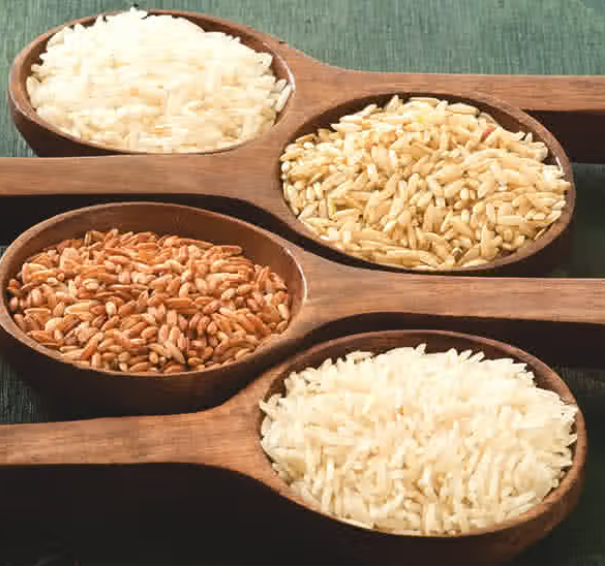
Is White Rice Healthier Than Brown Rice? A Guide to Nutrition and Health Benefits
When it comes to rice, many people wonder if white rice or brown rice is the healthier option. Both are widely consumed around the world, but which one should you choose for your diet? The answer largely depends on your health goals, taste preferences, and specific dietary needs.
While white rice is known for its softer texture and faster cooking time, brown rice is considered a more nutritious option due to its higher fiber content. In this article, we will break down the key differences between white and brown rice, examining their nutritional profiles, benefits for digestion, weight loss, blood sugar control, and more. We will also consider taste, cooking times, and dietary suitability.
Nutritional Differences: Brown Rice vs. White Rice
The primary difference between brown and white rice lies in their processing. Brown rice is a whole grain, retaining the bran and germ layers, while white rice is a refined grain that has had these layers removed. This processing affects their nutrient content.
Macronutrient Comparison
-
Calories: Brown rice typically contains slightly more calories due to its higher fiber content.
-
Brown rice: ~215 calories per cooked cup
-
White rice: ~205 calories per cooked cup
-
-
Carbohydrates: Both types of rice are high in carbs, but brown rice has more fiber.
-
Brown rice: ~45g carbs per cup (3.5g fiber)
-
White rice: ~45g carbs per cup (0.6g fiber)
-
-
Protein: Brown rice provides slightly more protein than white rice.
-
Brown rice: ~5g protein per cup
-
White rice: ~4g protein per cup
-
Micronutrient Comparison
-
B Vitamins: Brown rice is richer in B vitamins, such as B1, B3, and B6.
-
Brown rice: Higher levels of B1, B3, B6
-
White rice: Lower B vitamin content
-
-
Magnesium: Brown rice is an excellent source of magnesium, important for muscle and bone health.
-
Brown rice: ~84mg of magnesium per cup
-
White rice: ~19mg of magnesium per cup
-
-
Selenium: Brown rice contains more selenium, a key antioxidant.
-
Brown rice: ~19mcg of selenium per cup
-
White rice: ~8mcg of selenium per cup
-
-
Manganese: Brown rice is particularly high in manganese, which supports metabolism and antioxidant defenses.
-
Brown rice: ~1.1mg of manganese per cup
-
White rice: ~0.7mg of manganese per cup
-
Health Benefits of Brown Rice
Brown rice offers a variety of health benefits thanks to its higher fiber, antioxidants, and essential minerals. Here are some of the key advantages:
-
Supports Digestion and Satiety The fiber in brown rice helps promote regular bowel movements, prevent constipation, and keep you feeling full longer. This can support weight management by reducing the likelihood of overeating.
-
Rich in Antioxidants Brown rice contains antioxidants and phytochemicals, such as phenolic compounds, that help protect the body from oxidative stress and reduce the risk of chronic diseases like heart disease and diabetes.
-
Helps Regulate Blood Sugar Due to its lower glycemic index, brown rice causes a slower rise in blood sugar, which helps maintain stable glucose levels. This is beneficial for those with diabetes or those trying to prevent insulin resistance.
-
Promotes Heart Health The magnesium in brown rice helps regulate blood pressure and supports heart health. Diets rich in magnesium are associated with a lower risk of heart disease and hypertension.
Is White Rice Really Bad?
While white rice often gets a bad rap due to its lower nutrient content compared to brown rice, it’s not inherently unhealthy when consumed in moderation. Let’s address some of the myths about white rice:
-
White Rice Isn’t Inherently Bad White rice is often labeled as the “unhealthy” option, but when eaten as part of a balanced diet, it can still provide health benefits. Many countries fortify white rice with essential nutrients like folic acid and iron, making it a valuable source of these micronutrients.
-
Easier to Digest White rice is gentler on the digestive system than brown rice, making it a better option for individuals with digestive issues like irritable bowel syndrome (IBS) or sensitive stomachs. It’s also often recommended during gastrointestinal distress or after digestive surgery.
-
Part of Traditional Diets In many cultures, white rice is a staple food. For example, traditional diets in Japan and India feature white rice alongside vegetables, lean proteins, and fish. These diets are associated with longevity and heart health, suggesting that white rice can be part of a healthy diet when consumed in moderation.
-
Blood Sugar Control One of the concerns with white rice is its high glycemic index, which can cause rapid spikes in blood sugar. However, portion control is key. Eating white rice in moderation, combined with fiber-rich vegetables or lean proteins, can help mitigate its impact on blood sugar levels.
Weight Loss, Digestion, and Blood Sugar Management
When comparing brown rice and white rice for weight loss, digestion, and blood sugar management, there are some important considerations:
-
Weight Loss: Brown rice is better for weight loss due to its higher fiber content, which helps keep you full for longer. The fiber in brown rice also aids digestion, promoting regular bowel movements and reducing hunger.
-
Digestion: For people with sensitive stomachs or digestive issues, white rice is easier to digest because it lacks the tough bran and germ present in brown rice.
-
Blood Sugar Control: Brown rice has a lower glycemic index, making it a better option for blood sugar control. White rice, on the other hand, is digested quickly, leading to rapid increases in blood sugar.
Which Rice Is Better for You?
Ultimately, the choice between brown rice and white rice depends on your personal health goals and needs.
-
Weight Loss: Brown rice is the better option due to its fiber content, which helps with satiety and appetite control.
-
Digestive Issues: White rice is easier to digest and may be a better choice for people with digestive sensitivities or conditions like IBS.
-
Blood Sugar Management: Brown rice is the preferred choice for those managing blood sugar levels due to its lower glycemic index.
-
Athletes: White rice can be a good option for athletes who need quick energy, as it’s digested and absorbed rapidly.
Conclusion
Both brown rice and white rice can be part of a healthy diet, but their benefits depend on your individual health goals. Brown rice is generally better for weight loss, digestion, and blood sugar control, while white rice may be a better choice for those with digestive issues or those in need of quick energy.
By considering your specific needs, lifestyle, and preferences, you can make an informed choice between brown and white rice that best supports your health.




